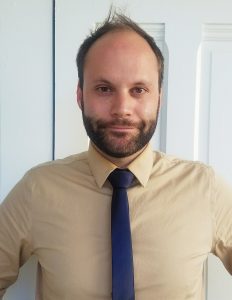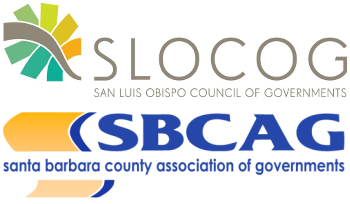Learning From The TDM Pros: An Interview With Peter Williamson
Here at RideAmigos we love celebrating the success of our partners and helping others learn from their wisdom!
Peter Williamson is the Employer Outreach Coordinator for the San Luis Obispo Council of Government’s (SLOCOG) commuter program, the Back ‘N’ Forth Club, which supports employers in shifting commuter behavior. Peter is also one of the all-star members of the RideAmigos Academy, where he’s a frequent webinar conversation partner and a leader in our Coffee Talk X initiative.
Peter was recently recognized as one of the Association for Commuter Transportation (ACT) 2017 “Top 40 Under 40.” We sat down with him to learn more about his work helping employers support smart commute choices in their workplaces:
 RideAmigos: Congrats on your recent award, and on a successful Rideshare Week 2017! I know you’re still crunching numbers and analyzing outcomes, but are there any things you learned from this year’s challenge? Any lessons for next year?
RideAmigos: Congrats on your recent award, and on a successful Rideshare Week 2017! I know you’re still crunching numbers and analyzing outcomes, but are there any things you learned from this year’s challenge? Any lessons for next year?
Peter Williamson: The goal of Rideshare Week is to develop an awareness of how we commute and the impact that our commute choices have on our wallets, health, and community. We asked community members to pledge to make at least one smart commute choice during Rideshare Week (October 2-6th) to reduce the number of single occupant vehicles on our region’s roadways. In SLO County, 683 commuters pledged to commute by carpool, vanpool, bike, foot, or bus, and then logged their trips at iRideshare.org.
Our Back ‘N’ Forth Club challenge put employers into two categories: 20+ employees or 60+ employees. The usual suspects (Cal Poly and SRAM) made the biggest impact and won this year’s Rideshare Week Challenge. Our winners receive a paid Best Workplaces for Commuters designation. This award puts our employers on the national map, and provides them with a valuable recruitment tool.
In addition to an online pledge, we asked willing employers to host a roll-up banner that employees could sign. One unexpected outcome was that some employees went outside of the box and expressed mode pride (i.e.: signed Peter – [draw a picture of a bike] 3 x a week!). I would like to do our part to encourage this next year (perhaps by having Lead Super Commuter/ETCs set the precedent).
For the challenge, I want to make it more competitive for Cal Poly, MINDBODY, and all other employers. I hope to accomplish this by mirroring what I did with the county my first year at SLOCOG. This would mean breaking Cal Poly and MINDBODY into sub networks by department. These departments could compete against other employers and departments based on size, making it more competitive for everyone. This effort simultaneously improves program communication at these larger employer sites.
Rideshare Week 2017 Trip Log Stats:
- 2,749 single-occupant vehicle trips eliminated
- 39,022 less vehicle miles traveled
- 9.8 tons of CO2 prevented
- $12,339 in commute costs saved
- 156,415 calories burned
RA: As an Employer Outreach Coordinator you spend a lot of time and energy working with organizations to help them promote and support alternatives to solo driving. How do you help employers see the value in promoting alternative commuting options?
PW: The two biggest factors when approaching a new employer are: what is the time/money commitment, and who else is doing it? I take employers through the following outline:
- What is the expected return on investment for starting a program?
- Free extension of human resources and benefits
- Reduced parking demand
- National and regional recognition
- Recruit talent from big cities
- Retain employees that live further away
- Payroll tax savings
- Measurable environmental impacts
- Reduced employee stress and health costs
- And support for the local community
- I highlight a few of the many tools, incentives, and services we offer participating employers.
- I explain different participation designations and similar employers participating in each designation.
- I ask the employer to nominate a program liaison (Lead Super Commuter / ETC).
RA: Transportation demand management (TDM) programming is obviously a year-round endeavor, but do you have any particularly favorite seasons or annual programs? What makes them your favorite?
PW: Of all SLOCOG/RIDESHARE’s campaigns, nothing compares with the community participation and awareness associated with Bike Month. It’s very well established, likely because our staff used to spend half of the year focused on this campaign. For me it’s valuable because Bike Month is the perfect opportunity to grow employer support of the Back ‘N’ Forth Club. Each year, I’m pushing employers to take their commitment a step further. Spring means employers are calling me, rather than the other way around.
RA: From transportation network companies like Uber and Lyft to autonomous vehicles, technology is rapidly expanding the options people have for transportation. How do you see emerging technologies impacting your TDM programs in the future?
PW: Uber and Lyft have already had an impact locally, whether good (less drinking and driving) or bad (more cars in higher-traffic areas). Our guaranteed ride home policy is very flexible, so we’ve noticed a trend in people selecting Uber/Lyft over the original options of a taxi, rental car, or shuttle. I hope technology continues to make data collection and program enforcement easy. I also hope technology reduces traffic congestion, and does not increase it, the fear being that people send their autonomous cars home to park themselves resulting in twice as many trips!
RA: Any parting advice or morsels of wisdom for someone who is new to this movement of shifting commuter behavior for the common good?
PW: Every day is filled with highs and lows that deliver the inspiration I need to keep moving towards a multi-modal world. What started as training for a 200-mile bike ride has grown into a career and lifestyle full of passion. It takes time to change commute behavior, but with a lot of persistence, passion, and patience, TDM professionals do make a difference. What seems like a dead end now will turn into an opportunity next year!
RA: Thanks for your time, and congratulations again on your recent recognition and all your programs’ success!
PW: Thank you!
We’re proud to count Peter and the whole team at SLOCOG as partners in the RideAmigos family, working together to transform transportation. To learn more about how you can shift commuter behavior more effectively and efficiently, contact us today!

